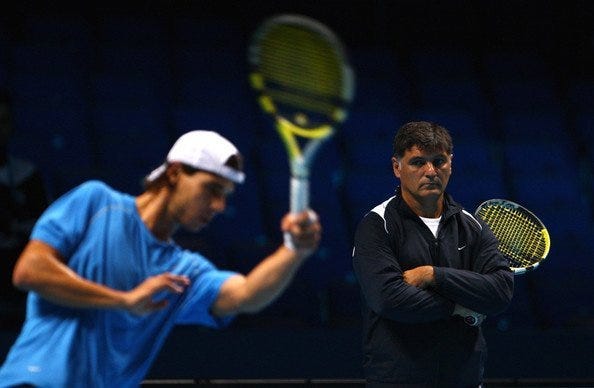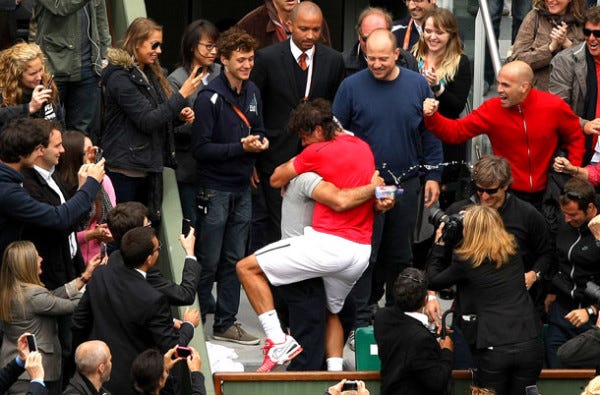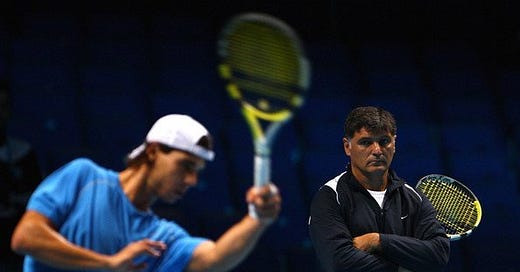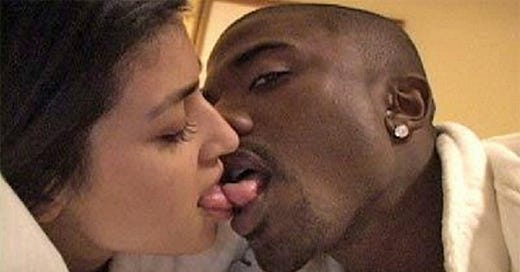Rafael Nadal’s Coach Discusses Mental Strength
Click to read the full story: Rafael Nadal’s Coach Discusses Mental Strength

Over the past two years, Rafael Nadal has had to overcome injuries and this year, he seems to also be battling with himself on the court. He recently dropped from number three ranking to number five, which is the lowest he’s been in years, and his uncle/coach Toni Nadal talks about the mental fortitude he’s struggling to regain in his game.
Toni Nadal, the uncle and coach of Spanish tennis great Rafael Nadal, said his nephew is struggling with the mental side of his game and needs “a bit of luck” to get back on track, but he stressed that the winner of 14 Grand Slam singles titles – three short of Swiss rival Roger Federer‘s record – will never settle for anything less than competing at the very highest level.
The 54-year-old Nadal, whose recent book “Todo se puede entrenar” (Everything is Coachable), published by Spain’s Alienta, details his training methods and the importance of developing character and mental strength, said in an interview with Efe that the former top-ranked player is not content with his current ranking of No. 5.
He also said it would be a great thrill if his 28-year-old nephew, who failed to reach the semifinals of three major hard-court tournaments this year, the Australian Open, Indian Wells and the Miami Open, is able to capture his 10th French Open title – tennis’ premier clay-court event – in June.

Q. What did you want to get across in the book?
A. The experiences we’ve had and what I think about all aspects of life and especially to say that everything can be worked on and improved. Above all, to say that with effort, dedication and commitment to what you’re doing, you can better yourself a great deal.
Q. To what extent is tennis psychological, mental?
A. I’ve often heard that in sport the difference is between the ears, and I think that’s a mistake. In the case of tennis, it’s in the legs and your arm. It’s also true you need to be mentally prepared so you can execute what you know how to do.
Q. Recently some comments of your appeared in which you said that (Rafa Nadal) was lacking mental fortitude. Can you say what you meant by that?
A. It’s true. What had always been Rafael’s strength hasn’t been in recent tournaments. That mental strength that he had to overcome difficulties, it’s harder to come by right now. But we’re working to get it back. It’s a temporary issue, and as he plays matches and we’re lucky to win an important match (and then) several in a row, Rafael will recover the form he had before his (last year’s wrist) injury.
Q. How do you work on Rafael Nadal’s mind to overcome adversity or the situation he’s in now?
A. It’s not easy because in a given situation you can tell him not to get tense, but there’ll be a day when, even when that’s the case, he can keep playing. It has to come. It’ll come with work, with reflection, and a little luck.
Q. Has Rafa been settling for less?
A. I don’t think so. I don’t think that’s the reason for his inconsistent play at the moment. Rafael has the same desire to do things well. He’s never settled for less during all these years, and there would be no reason for him to do so now. Rafael is an athlete who likes to win and doesn’t like to lose. I don’t think he’s been settling for less.
Q: Rafa has won (a record) nine Roland Garros (French Open) titles. Winning a 10th title this year would be a tremendous feat. Is he thinking about that?
A: It would obviously be a great thrill because it would mean winning his 15th Grand Slam title, and it would put him past (American great Pete) Sampras even … And it would also mean he’s completely recovered his form, which would be just as special as the other thing.
The post Rafael Nadal’s Coach Discusses Mental Strength appeared first on Movie TV Tech Geeks News By: Jackie Warner








